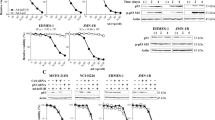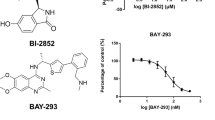Abstract
Ras mutations are present in ∼95% of pancreatic cancer (PC) cases leading to increased proliferation and apoptosis resistance. The aim of this study is to selectively kill Ras-transformed cells by overexpressing the pro-apoptotic protein, p53 upregulated modulator of apoptosis (PUMA) under a Ras-responsive promoter. Colo357, Panc1 and MiaPaca, PC cell lines harboring K-Ras mutations, normal rat IEC18 enterocytes, and their K-Ras transformed R1 counterparts, were tested. We constructed adenoviral vectors containing the PUMA gene downstream to: (1) Four or five repetitive Ras-responsive elements (Ad-PY4/PY5-PUMA) and (2) a negative control (Ad-SV40-PUMA). Cell viability was estimated by 3-(4, 5-dimethylthiazol-2-yl)-2,5-diphenyltetrazolium bromide (MTT) and apoptosis was evaluated by FACS. In vivo potency of the adenoviruses was evaluated in athymic nude mice. Infection with Ad-PY4/PY5-PUMA markedly inhibited cell growth (∼40–50%), and apoptosis was detected in all cells with high Ras activity, whereas IEC18 cells remained unaffected. The control vector, Ad-SV40-PUMA, did not induce any cell death. Selective and high expression of PUMA was detected in Ad-PY4-PUMA-infected cells. In vivo, Ad-PY4-PUMA inhibited by ∼35% the growth of established tumors compared with the Ad-SV40-PUMA. Selective overexpression of PUMA efficiently inhibits the growth of Ras-transformed cells while sparing the normal ones. This treatment modality may become a useful, effective and safe approach to selectively target Ras-mutated tumor cells.
This is a preview of subscription content, access via your institution
Access options
Subscribe to this journal
Receive 12 print issues and online access
$259.00 per year
only $21.58 per issue
Buy this article
- Purchase on Springer Link
- Instant access to full article PDF
Prices may be subject to local taxes which are calculated during checkout








Similar content being viewed by others
References
Jemal A, Bray F, Center MM, Ferlay J, Ward E, Forman D . Global cancer statistics. CA Cancer J Clin 61: 69–90.
Palmer DH, Chen MJ, Kerr DJ . Gene therapy for colorectal cancer. Br Med Bull 2002; 64: 201–225.
Huang SL, Wu Y, Yu H, Zhang P, Zhang XQ, Ying L et al. Inhibition of Bcl-2 expression by a novel tumor-specific RNA interference system increases chemosensitivity to 5-fluorouracil in Hela cells. Acta Pharmacol Sin 2006; 27: 242–248.
Jakubczak JL, Ryan P, Gorziglia M, Clarke L, Hawkins LK, Hay C et al. An oncolytic adenovirus selective for retinoblastoma tumor suppressor protein pathway-defective tumors: dependence on E1A, the E2F-1 promoter, and viral replication for selectivity and efficacy. Cancer Res 2003; 63: 1490–1499.
Kang YA, Shin HC, Yoo JY, Kim JH, Kim JS, Yun CO . Novel cancer antiangiotherapy using the VEGF promoter-targeted artificial zinc-finger protein and oncolytic adenovirus. Mol Ther 2008; 16: 1033–1040.
Willhauck MJ, Sharif Samani BR, Klutz K, Cengic N, Wolf I, Mohr L et al. Alpha-fetoprotein promoter-targeted sodium iodide symporter gene therapy of hepatocellular carcinoma. Gene Ther 2008; 15: 214–223.
Liu T, Zhang G, Chen YH, Chen Y, Liu X, Peng J et al. Tissue specific expression of suicide genes delivered by nanoparticles inhibits gastric carcinoma growth. Cancer Biol Ther 2006; 5: 1683–1690.
Klein WM, Hruban RH, Klein-Szanto AJ, Wilentz RE . Direct correlation between proliferative activity and dysplasia in pancreatic intraepithelial neoplasia (PanIN): additional evidence for a recently proposed model of progression. Mod Pathol 2002; 15: 441–447.
Hruban RH, Maitra A, Schulick R, Laheru D, Herman J, Kern SE et al. Emerging molecular biology of pancreatic cancer. Gastrointest Cancer Res 2008; 2: S10–S15.
Fearon ER . K-ras gene mutation as a pathogenetic and diagnostic marker in human cancer. J Natl Cancer Inst 1993; 85: 1978–1980.
Lowy DR, Willumsen BM . The ras gene family. Cancer Surv 1986; 5: 275–289.
Khosravi-Far R, Der CJ . The Ras signal transduction pathway. Cancer Metastasis Rev 1994; 13: 67–89.
Malumbres M, Barbacid M . RAS oncogenes: the first 30 years. Nat Rev Cancer 2003; 3: 459–465.
Reddy MA, Langer SJ, Colman MS, Ostrowski MC . An enhancer element responsive to ras and fms signaling pathways is composed of two distinct nuclear factor binding sites. Mol Endocrinol 1992; 6: 1051–1060.
Gutman A, Wasylyk B . Nuclear targets for transcription regulation by oncogenes. Trends Genet 1991; 7: 49–54.
Wasylyk C, Flores P, Gutman A, Wasylyk B . PEA3 is a nuclear target for transcription activation by non-nuclear oncogenes. EMBO J 1989; 8: 3371–3378.
Bortner DM, Langer SJ, Ostrowski MC . Non-nuclear oncogenes and the regulation of gene expression in transformed cells. Crit Rev Oncog 1993; 4: 137–160.
Aoyama A, Klemenz R . Oncogene-mediated effects on cellular gene expression. Crit Rev Oncog 1993; 4: 53–94.
Chambers AF, Tuck AB . Ras-responsive genes and tumor metastasis. Crit Rev Oncog 1993; 4: 95–114.
Sassone-Corsi P, Der CJ, Verma IM . Ras-induced neuronal differentiation of PC12 cells: possible involvement of fos and jun. Mol Cell Biol 1989; 9: 3174–3183.
Grady WM, Markowitz SD . Genetic and epigenetic alterations in colon cancer. Annu Rev Genomics Hum Genet 2002; 3: 101–128.
Sif S, Capobianco AJ, Gilmore TD . The v-Rel oncoprotein increases expression from Sp1 site-containing promoters in chicken embryo fibroblasts. Oncogene 1993; 8: 2501–2509.
Wasylyk C, Gutman A, Nicholson R, Wasylyk B . The c-Ets oncoprotein activates the stromelysin promoter through the same elements as several non-nuclear oncoproteins. EMBO J 1991; 10: 1127–1134.
Arber N, Sutter T, Miyake M, Kahn SM, Venkatraj VS, Sobrino A et al. Increased expression of cyclin D1 and the Rb tumor suppressor gene in c-K-ras transformed rat enterocytes. Oncogene 1996; 12: 1903–1908.
Dvory-Sobol H, Kazanov D, Arber N . Gene targeting approach to selectively kill colon cancer cells, with hyperactive K-Ras pathway. Biomed Pharmacother 2005; 59 (Suppl 2): S370–S374.
McConnell MJ, Imperiale MJ . Biology of adenovirus and its use as a vector for gene therapy. Hum Gene Ther 2004; 15: 1022–1033.
Nakano K, PUMA Vousden KH . a novel proapoptotic gene, is induced by p53. Mol Cell 2001; 7: 683–694.
Ekoff M, Kaufmann T, Engstrom M, Motoyama N, Villunger A, Jonsson JI et al. The BH3-only protein Puma plays an essential role in cytokine deprivation induced apoptosis of mast cells. Blood 2007; 110: 3209–3217.
Chen Y, Qian H, Wang H, Zhang X, Fu M, Liang X et al. Ad-PUMA sensitizes drug-resistant choriocarcinoma cells to chemotherapeutic agents. Gynecol Oncol 2007; 107: 505–512.
Yu J, Zhang L, Hwang PM, Kinzler KW, Vogelstein B . PUMA induces the rapid apoptosis of colorectal cancer cells. Mol Cell 2001; 7: 673–682.
Wang H, Qian H, Yu J, Zhang X, Zhang L, Fu M et al. Administration of PUMA adenovirus increases the sensitivity of esophageal cancer cells to anticancer drugs. Cancer Biol Ther 2006; 5: 380–385.
Yu J, Yue W, Wu B, Zhang L . PUMA sensitizes lung cancer cells to chemotherapeutic agents and irradiation. Clin Cancer Res 2006; 12: 2928–2936.
Sun Q, Sakaida T, Yue W, Gollin SM, Yu J . Chemosensitization of head and neck cancer cells by PUMA. Mol Cancer Ther 2007; 6: 3180–3188.
Yu J, Wang Z, Kinzler KW, Vogelstein B, Zhang L . PUMA mediates the apoptotic response to p53 in colorectal cancer cells. Proc Natl Acad Sci USA 2003; 100: 1931–1936.
Arber N, Han EK, Sgambato A, Piazza GA, Delohery TM, Begemann M et al. A K-ras oncogene increases resistance to sulindac-induced apoptosis in rat enterocytes. Gastroenterology 1997; 113: 1892–1900.
Quaroni A, Isselbacher KJ . Cytotoxic effects and metabolism of benzo[a]pyrene and 7,12-dimethylbenz[a]anthracene in duodenal and ileal epithelial cell cultures. J Natl Cancer Inst 1981; 67: 1353–1362.
Volpers C, Kochanek S . Adenoviral vectors for gene transfer and therapy. J Gene Med 2004; 6 (Suppl 1): S164–S171.
Arafat WO, Gomez-Navarro J, Xiang J, Barnes MN, Mahasreshti P, Alvarez RD et al. An adenovirus encoding proapoptotic Bax induces apoptosis and enhances the radiation effect in human ovarian cancer. Mol Ther 2000; 1: 545–554.
Bischoff JR, Kirn DH, Williams A, Heise C, Horn S, Muna M et al. An adenovirus mutant that replicates selectively in p53-deficient human tumor cells. Science 1996; 274: 373–376.
Khuri FR, Nemunaitis J, Ganly I, Arseneau J, Tannock IF, Romel L et al. a controlled trial of intratumoral ONYX-015, a selectively-replicating adenovirus, in combination with cisplatin and 5-fluorouracil in patients with recurrent head and neck cancer. Nat Med 2000; 6: 879–885.
Swisher SG, Roth JA, Nemunaitis J, Lawrence DD, Kemp BL, Carrasco CH et al. Adenovirus-mediated p53 gene transfer in advanced non-small-cell lung cancer. J Natl Cancer Inst 1999; 91: 763–771.
Naumov I, Kazanov D, Lisiansky V, Starr A, Aroch I, Shapira S et al. Novel approach to abuse the hyperactive K-Ras pathway for adenoviral gene therapy of colorectal cancer. Exp Cell Res 318: 160–168.
Weill D, Mack M, Roth J, Swisher S, Proksch S, Merritt J et al. Adenoviral-mediated p53 gene transfer to non-small cell lung cancer through endobronchial injection. Chest 2000; 118: 966–970.
Acknowledgements
This study was partially supported by the Helen and Haim Lieber chair for cancer research and the Djerassi oncology center.
Author contributions
VL contributed to all the work described in this study was conducted by VL, writing of the manuscript, study concept and design. IN, SS, DK and AS contributed to technical support. NA and SK contributed to study supervision, study design, revision of the manuscript, professional counseling.
Author information
Authors and Affiliations
Corresponding author
Ethics declarations
Competing interests
The authors declare no conflict of interest.
Rights and permissions
About this article
Cite this article
Lisiansky, V., Naumov, I., Shapira, S. et al. Gene therapy of pancreatic cancer targeting the K-Ras oncogene. Cancer Gene Ther 19, 862–869 (2012). https://doi.org/10.1038/cgt.2012.73
Received:
Revised:
Accepted:
Published:
Issue Date:
DOI: https://doi.org/10.1038/cgt.2012.73



